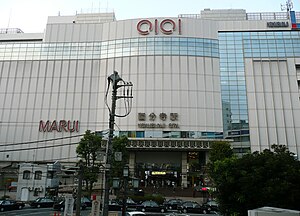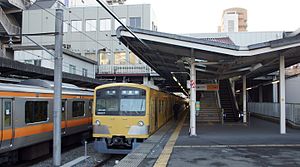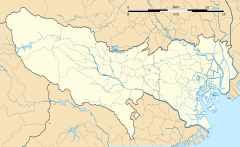Kokubunji Station
Kokubunji Station 国分寺駅 | |||||
|---|---|---|---|---|---|
 Kokubunji Station station building, October 2011 | |||||
| Japanese name | |||||
| Shinjitai | 国分寺駅 | ||||
| Kyūjitai | 國分寺驛 | ||||
| Hiragana | こくぶんじえき | ||||
| General information | |||||
| Location | 2-chome Honmachi, Kokubunji City, Tokyo Japan | ||||
| Coordinates | 35°42′01″N 139°28′49″E / 35.70028°N 139.48028°E | ||||
| Operated by | |||||
| Line(s) | |||||
| Connections | |||||
| Construction | |||||
| Structure type | At grade | ||||
| Other information | |||||
| Station code |
| ||||
| History | |||||
| Opened | 11 April 1889 | ||||
| |||||
Kokubunji Station (国分寺駅, Kokubunji-eki) is an interchange railway station located in the city of Kokubunji, Tokyo, Japan, operated by East Japan Railway Company (JR East) and private railway operator Seibu Railway.[1]
Lines
Kokubunji Station is served by the Chūō Line (Rapid) and is 31.4 kilometers from the terminus of the line at Tokyo. It also forms a terminus for both the Seibu Kokubunji and Seibu Tamako lines.[citation needed]
Station layout
The JR East side of the station consists of two island platforms serving four tracks. The station has a "Midori no Madoguchi" staffed ticket office.[1] The Seibu portion of the station has one side of a former island platform (Platform 5) parallel to and north of the JR platforms.[2] Platform 6 is now closed.[2] Platform 7 is further north again but is above and perpendicular to the other platforms.[2]
JR East
JC16 Kokubunji Station 国分寺駅 | ||||||||||||||||||||||||||||||
|---|---|---|---|---|---|---|---|---|---|---|---|---|---|---|---|---|---|---|---|---|---|---|---|---|---|---|---|---|---|---|
 JR East exit, July 2015 | ||||||||||||||||||||||||||||||
| General information | ||||||||||||||||||||||||||||||
| Location | 2-1-23 Honchō, Kokubunji-shi, Tokyo 185-0021 Japan | |||||||||||||||||||||||||||||
| Operated by | ||||||||||||||||||||||||||||||
| Line(s) | ■ Chūō Line (Rapid) | |||||||||||||||||||||||||||||
| Distance | 21.1 km (13.1 mi) from Shinjuku | |||||||||||||||||||||||||||||
| Platforms | 2 island platforms | |||||||||||||||||||||||||||||
| Tracks | 4 | |||||||||||||||||||||||||||||
| Construction | ||||||||||||||||||||||||||||||
| Structure type | At grade | |||||||||||||||||||||||||||||
| Other information | ||||||||||||||||||||||||||||||
| Status | Staffed ( "Midori no Madoguchi" ) | |||||||||||||||||||||||||||||
| Station code | JC16 | |||||||||||||||||||||||||||||
| History | ||||||||||||||||||||||||||||||
| Opened | 11 April 1889 | |||||||||||||||||||||||||||||
| Passengers | ||||||||||||||||||||||||||||||
| FY2019 | 112,090 daily | |||||||||||||||||||||||||||||
| Services | ||||||||||||||||||||||||||||||
| ||||||||||||||||||||||||||||||
JR Platforms
| 1/2 | JC Chūō Line (Rapid) | for Tachikawa and Hachiōji |
| 3/4 | JC Chūō Line (Rapid) | for Nakano, Shinjuku, and Tokyo |
-
The passenger waiting room on platform 5, November 2013
Seibu Railway
SK01 ST01 Kokubunji Station 国分寺駅 | |||||||||||||||
|---|---|---|---|---|---|---|---|---|---|---|---|---|---|---|---|
| Seibu station | |||||||||||||||
 Seibu Kokubunji Line train at platform 5, November 2013 | |||||||||||||||
| General information | |||||||||||||||
| Location | 2-1-23 Honchō, Kokubunji-shi, Tokyo 185-0021 Japan | ||||||||||||||
| Operated by | |||||||||||||||
| Line(s) | |||||||||||||||
| Platforms | 2 side platforms | ||||||||||||||
| Other information | |||||||||||||||
| Station code | SK01, ST01 | ||||||||||||||
| History | |||||||||||||||
| Opened | 21 December 1894 | ||||||||||||||
| Passengers | |||||||||||||||
| FY2019 | 117,796 daily | ||||||||||||||
| Services | |||||||||||||||
| |||||||||||||||
Seibu Platforms
| 5 | for Ogawa and Higashi-Murayama | |
| 7 | for Hagiyama and Tamako |
-
The east end of platform 5 viewed from the JR East platforms, November 2013
-
Seibu Kokubunji Station Platform 7, April 2021
History


What is now the JR East station opened on 11 April 1889.[3] The Seibu Kokubunji Line platforms opened on 21 December 1894, and the Tamako Railway (present-day Seibu Tamako Line) platforms opened on 6 April 1928.[2]
Station numbering was introduced on all Seibu Railway lines during fiscal 2012, with Kokubunji Station becoming "SK01" on the Seibu Kokubunji Line and "ST01" on the Seibu Tamako Line.[4]
Passenger statistics
In fiscal 2019, the station was used by an average of 112,090 passengers daily (boarding passengers only), making it the 31st busiest in the JR East network.[5] The Seibu station was used by an average of 117,796 passengers daily making it the sixth busiest station served by Seibu.[6] The passenger figures for previous years are as shown below. Note that JR East figures consider only boarding passengers whereas Seibu figures consider both entering and exiting passengers.
| Fiscal year | JR East | Seibu |
|---|---|---|
| 2000 | 100,815[7] | |
| 2005 | 103,862[8] | 116,629[9] |
| 2010 | 105,883[10] | 114,779[11] |
| 2015 | 111,325[12] | 118,392[13] |
Surrounding area
North side
South side
- Tonogayato Garden
- Hotel Mets Kokubunji
- Tokyo Keizai University
- Tokyo University of Agriculture and Technology
See also
References
- ^ a b 各駅情報(国分寺駅) [Station Information (Kokubunji Station)] (in Japanese). Japan: East Japan Railway Company. Retrieved 26 November 2012.
- ^ a b c d Kawashima, Ryozo (February 2011). 日本の鉄道 中部ライン 全線・全駅・全配線 第11巻 埼玉南部・東京多摩北部 [Railways of Japan - Chubu Line - Lines/Stations/Track plans - Vol 11 Southern Saitama and Northern Tama Tokyo]. Japan: Kodansha. pp. 10–88. ISBN 978-4-06-270071-9.
- ^ Kawashima, Ryozo (May 2010). 日本の鉄道 中部ライン 全線・全駅・全配線 第2巻 三鷹駅―八王子エリア [Railways of Japan - Chubu Line - Lines/Stations/Track plans - Vol 2 Mitaka Station - Hachioji Area]. Japan: Kodansha. p. 43. ISBN 978-4-06-270062-7.
- ^ 西武線全駅で駅ナンバリングを導入します [Station numbering to be introduced at all Seibu stations] (PDF). News Release (in Japanese). Japan: Seibu Railway. 23 February 2012. Archived from the original (PDF) on 24 September 2015. Retrieved 17 November 2013.
- ^ 各駅の乗車人員 (2020年度) [Station passenger figures (Fiscal 2020)] (in Japanese). Japan: East Japan Railway Company. Retrieved 29 January 2021.
- ^ 各駅の乗車人員 (2020年度) [Station passenger figures (Fiscal 2020)] (in Japanese). Japan: Seibu Railway. Retrieved 29 January 2021.
- ^ 各駅の乗車人員 (2000年度) [Station passenger figures (Fiscal 2000)] (in Japanese). Japan: East Japan Railway Company. Archived from the original on 9 October 2014. Retrieved 17 November 2013.
- ^ 各駅の乗車人員 (2005年度) [Station passenger figures (Fiscal 2005)] (in Japanese). Japan: East Japan Railway Company. Archived from the original on 9 October 2014. Retrieved 17 November 2013.
- ^ 駅別乗降人員 2005(平成17)年度 1日平均 [Average daily station usage figures (fiscal 2005)] (PDF) (in Japanese). Japan: Seibu Railway. Archived from the original (PDF) on 5 March 2016. Retrieved 18 August 2014.
- ^ 各駅の乗車人員 (2010年度) [Station passenger figures (Fiscal 2010)] (in Japanese). Japan: East Japan Railway Company. Archived from the original on 6 October 2014. Retrieved 17 November 2013.
- ^ 駅別乗降人員 2010(平成22)年度 1日平均 [Average daily station usage figures (fiscal 2010)] (PDF) (in Japanese). Japan: Seibu Railway. Archived from the original (PDF) on 26 June 2011. Retrieved 17 November 2013.
- ^ 各駅の乗車人員 (2015年度) [Station passenger figures (Fiscal 2015)] (in Japanese). Japan: East Japan Railway Company. Retrieved 2 September 2020.
- ^ 駅別乗降人員 2015(平成27)年度 1日平均 [Average daily station usage figures (fiscal 2015)] (PDF) (in Japanese). Japan: Seibu Railway.
External links
![]() Media related to Kokubunji Station at Wikimedia Commons
Media related to Kokubunji Station at Wikimedia Commons
- Kokubunji Station information (JR East) (in Japanese)
- Kokubunji Station information (Seibu) (in Japanese)





